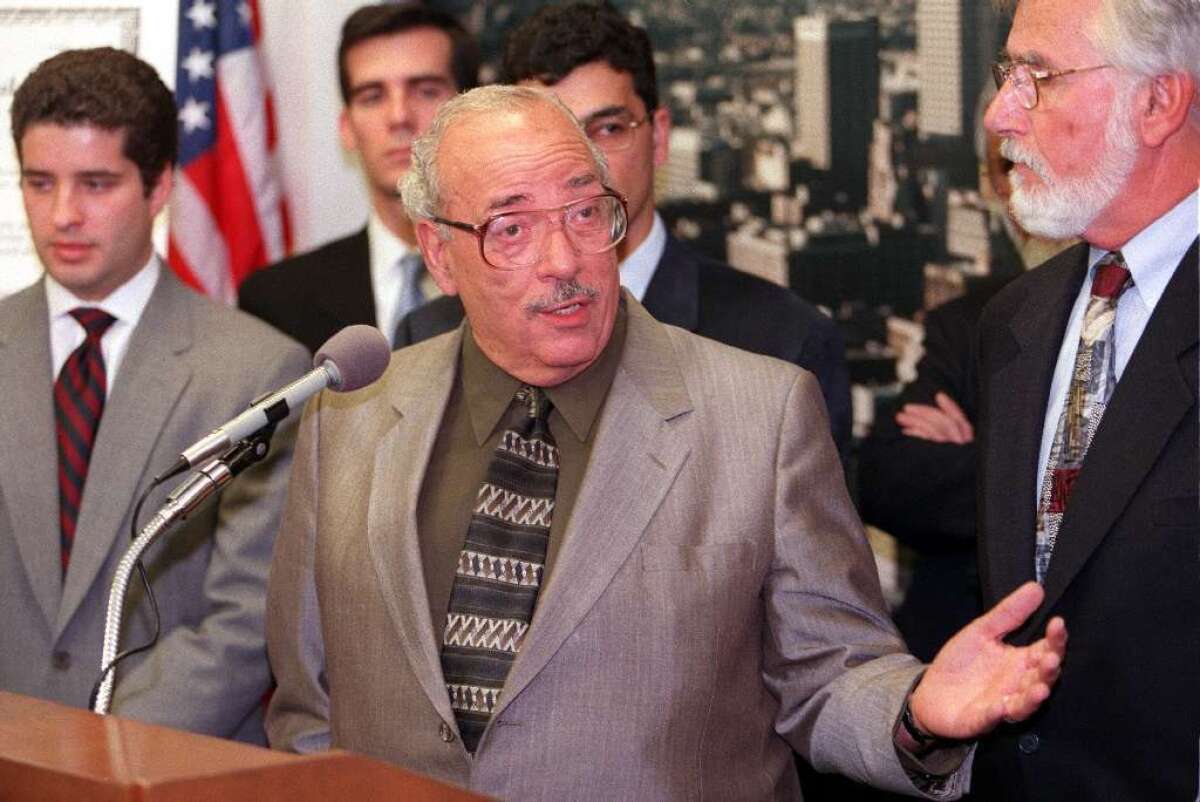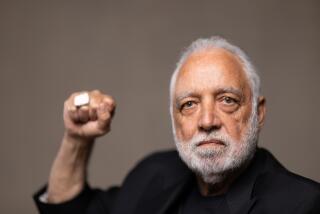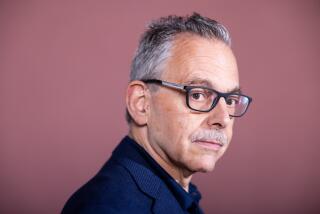Dr. Maher Hathout, Muslim advocate for interfaith peace, dies at 79

- Share via
After moving to Los Angeles in the late 1970s, Dr. Maher Hathout became a leading advocate for peace between Islam and other religions. But that work received a severe test in 2006, when his nomination for a prestigious humanitarian prize exposed fault lines that have long divided L.A.’s faith communities.
At a tense public meeting before a final vote on the award, critics blasted Hathout, the longtime chairman of the Islamic Center of Southern California, charging that disparaging remarks he had made about Israel proved he was unfit to be called a peacemaker. Countering the naysayers were equally ardent supporters, including Jewish and Christian leaders who told the Los Angeles County Human Relations Commission that Hathout’s interfaith leadership and his promotion of a moderate Islam made him perfect for the honor.
“It felt like a showdown, the problems we see on the world stage playing out in that room,” recalled Leonard Beerman, who died last month. Beerman was the founding rabbi of the Leo Baeck Temple and had become a confidant of Hathout.
In the end, though, several commission members abstained while others simply didn’t show up for the controversial vote, and Hathout was granted the John Allen Buggs award. Flanked by bodyguards, he called the moment a victory for free speech and accepted the award in the name of “Jews, Christians, Buddhists, atheists and Muslims” who supported him.
Said Beerman: “Rather than outwardly express anger toward his critics, rather than expressing that his argument had won the day, he expressed a gracious desire for communication with those who stood against him. It was a sign of who he was as a man.”
Hathout, 79, died Saturday at City of Hope hospital in Duarte. The cause was cancer, said Salam Al-Marayati, president of the Muslim Public Affairs Council.
For roughly three decades Hathout led the Islamic Center, one of the nation’s most influential mosques, serving first as its chairman and later as its chief spokesman. He also founded the Muslim Public Affairs Council, an advocacy group now based in Los Angeles and Washington, D.C., and helped found New Horizon, one of the area’s first Islamic-oriented private schools.
“This was often very controversial within our community, but he said that Muslims in America need to have a distinct identity,” be a part of America, not removed from it, said Al-Marayati. “We should not always be looking to the Middle East for answers. Islam in the West will be the new era.”
Hathout was born in Cairo on Jan. 1, 1936, and raised in Egypt. His views sprang partly from his youthful political activity. As a college student he protested vigorously against Egypt’s military rulers, ending up in jail during long stretches of the mid-1950s for criticizing a regime that many in his country felt was oppressive. Unbowed, he used the time in jail to begin refining a theology that wedded traditional Islam with a forward-looking, global outlook.
After finishing medical school in Egypt, Hathout immigrated to the U.S. in the early 1970s, moving first to Buffalo, N.Y., then to Los Angeles, where he worked as a cardiologist and directed the small but burgeoning Islamic center.
“He revolutionized the place,” Al-Marayati said. Hathout ensured that women be fully welcomed, that all speeches at the center be made in English, and that it not have an Imam or identify with any particular Muslim sect. He also stipulated that critical thinking about the faith was an obligation.
Outside the Islamic community, Hathout became best known for trying to foster close ties between religious groups in Los Angeles, even though some of that work, such as the region’s first notable Muslim-Jewish dialogue group, dissolved rancorously as Middle East conflict grew in the 1990s.
Undaunted, Hathout teamed with some of the region’s most powerful Jewish and Christian leaders on a variety of social justice campaigns, including protests against the spread of nuclear weapons and U.S.-led wars in Kuwait and Iraq. He spoke with presidents Bill Clinton and George W. Bush about improving relations with the Muslim world and authored books that undermined Islamic justification for terrorism.
“He was a voice of moderation,” said the Rev. George Regas, former pastor at All Saints Episcopal church in Pasadena. “The strongest voice speaking out against what the terrorists were trying to say. He stood up and said radicalism of all stripes is [a] dangerous, destructive type of thinking.”
In the summer of 2006, Hathout seemed a slam-dunk for the county humanitarian award. But controversy arose when it was revealed that he had made comments denouncing Israel as an apartheid regime.
Such views sparked outrage from Jews who said the Muslim leader was simply masking himself as a moderate. In a public hearing on Hathout’s nomination, echoing other critics, Roz Rothstein, national director of the pro-Israel organization StandWithUS, said his selection would “further divide our city and will set up extremist rhetoric as a desirable form of public discourse.”
A far different take came from Dan Wolf, whose deceased father, Rabbi Alfred Wolf, had long led the influential Wilshire Boulevard Temple. Recalling the deep friendship between his father and Hathout, Dan Wolf spoke forcefully at the hearing: “Were he alive today, my father would be here instead of me, speaking far more eloquently than I on behalf of Dr. Hathout and his life as a fellow builder of bridges.
“To be sure, Dad and Dr. Hathout did not agree on everything — what brothers do? But brothers they were.”
Hathout is survived by his wife, Ragaa; a son, Gasser; a daughter, Samer Hathout-Blackshire: and four grandchildren, all of Los Angeles.
More to Read
Start your day right
Sign up for Essential California for the L.A. Times biggest news, features and recommendations in your inbox six days a week.
You may occasionally receive promotional content from the Los Angeles Times.








